The blogger who hit back against a hammer-wielding Russian ‘assassin’
- Published
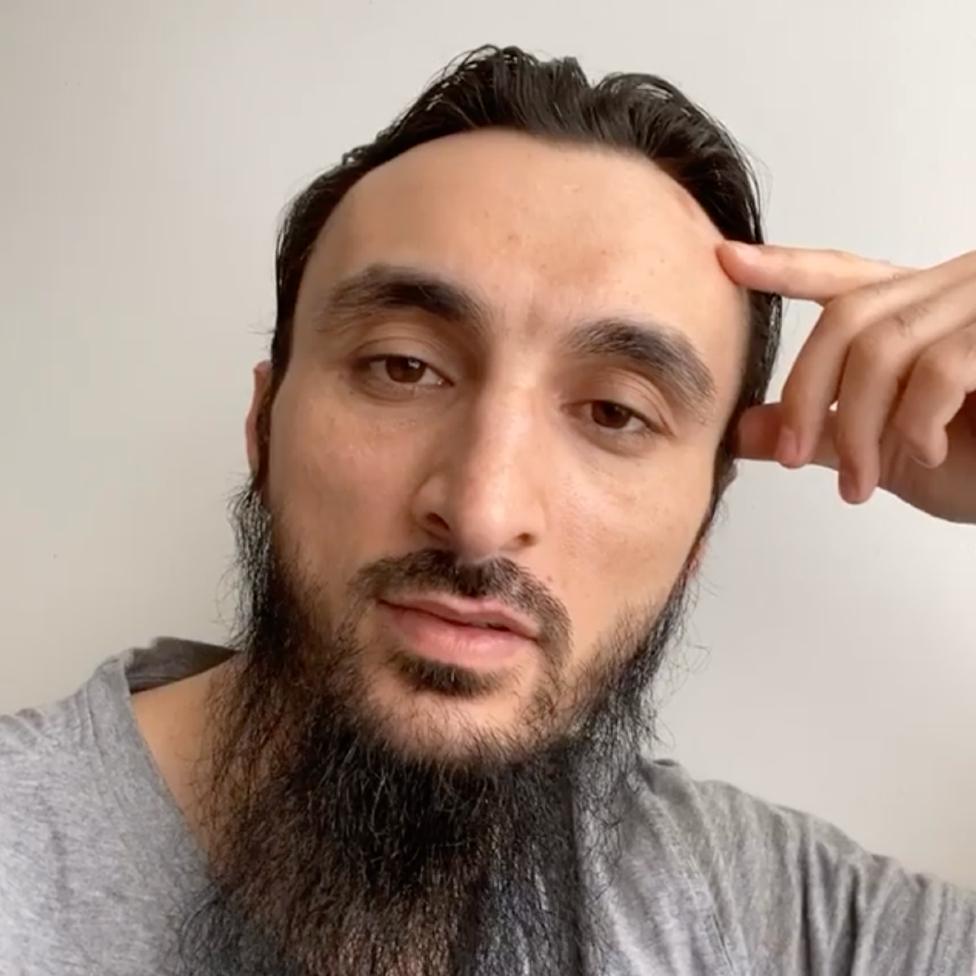

Sergei Skripal was poisoned with the nerve agent Novichok, Alexander Litvinenko was killed with radioactive polonium… by contrast the man who attacked Chechen blogger Tumso Abdurakhmanov was armed with nothing more than a hammer. But he is still convinced that Russian security services were involved, reports Nick Sturdee.
It's 26 February 2020. A half-naked man is catching his breath, filming himself in the half light. He's just grabbed the phone and is streaming live on Instagram. He switches from selfie mode and we see a second man, fully dressed, lying face down next to a bed. From his head, a half-metre trail of thick blood, pasted along a linoleum floor across which he has apparently been dragged.
"Who sent you?" demands the man who is filming. "Who sent you?!" he repeats, raising his voice.
His name is Tumso Abdurakhmanov, and he's a Chechen blogger living in hiding in the town of Gavle, in eastern Sweden.
He's holding a hammer, and anxiously looks over his shoulder - clearly concerned there might be someone else in the flat.
"Who sent you, I asked!"
The man groans. He says weakly that he was sent by a man from Grozny - the Chechen capital. And that he's from Moscow.
"How did you get my address?" asks Tumso.
"They told me."
"And what's your name?"
"Ruslan."
Tumso Abdurakhmanov is an asylum seeker, and he has just managed to beat off a man who assaulted him with a hammer as he slept. He has been expecting something like this to happen. In the preceding six months two other Chechen asylum seekers have been attacked - one gunned down in a Berlin park, the other stabbed to death in a hotel in northern France. He's been tipped off there's money on his head too.

Three months later, speaking to the BBC from a new, secret location in Sweden, 34-year-old Tumso describes being woken by a series of blows to the head, the struggle to get out from under his duvet, and an exhausting wrestling match that ensued, on and off the bed. Tumso isn't a big man, but at a certain point he succeeded, stunned, in getting on top of his assailant, to see his own blood drip on to the other man's face and into his mouth. The bigger man then overpowered him, but eventually, as they struggled, the hammer fell from his slippery woollen gloves.
Tumso then seized it and dealt a series of blows to his attacker's head.
"To start with he fought back fiercely, he tried to protect himself. But after a few blows with the hammer he started to talk to me. Up till then we hadn't spoken at all. I didn't know if he spoke Russian, or who he was. He gave his name. He said, 'Please don't hit me. I'll tell you everything.'"
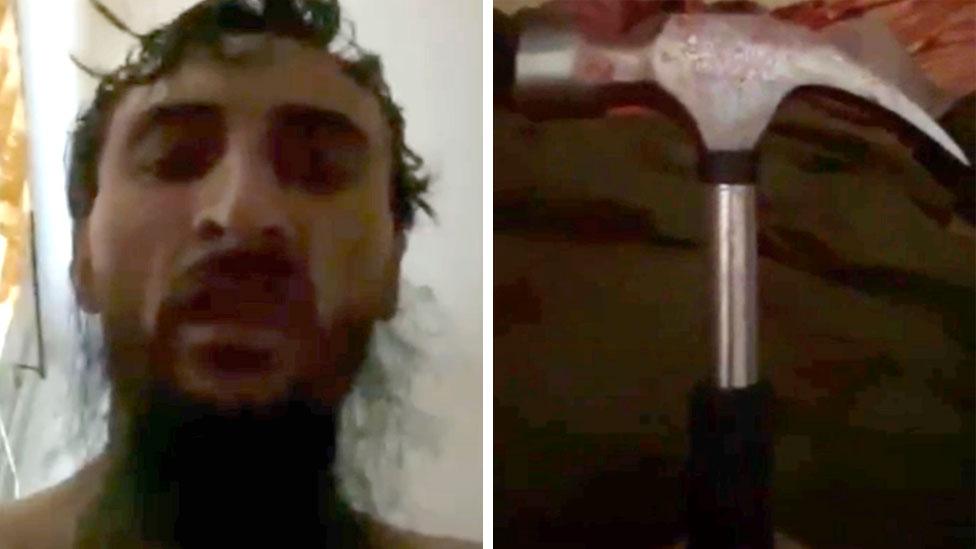
Tumso panting as he questions Mamaev - and holds the bloodstained hammer
Police arrived to find the gruesome spectacle of two Russian citizens, their heads bloodied from a vicious fight with a hammer. The larger, fully dressed man had already slipped into unconsciousness. The less wounded of the two - Tumso - was arrested. But after three days of police questioning he was reclassified as a crime victim, and the second man, 29-year-old Ruslan Mamaev, was detained on suspicion of attempted murder, which he denies.
In an extremely rare development, the investigation was handed to the country's Security Services. For Tumso's lawyer, Jens Sjolund, the reason is clear - suspicions that another nation state is behind the attack. Russia.
Tumso Abdurakhmanov is one of up to 130,000 Chechen refugees in European countries, many of whom have fled from the violent and tyrannical rule of the semi-autonomous republic's Kremlin-backed leader, Ramzan Kadyrov.
He left three years ago after a run-in with the then mayor of Grozny, Kadyrov's cousin, led to threats that he would be disappeared - abducted, tortured and possibly killed - like so many other critics of the regime.
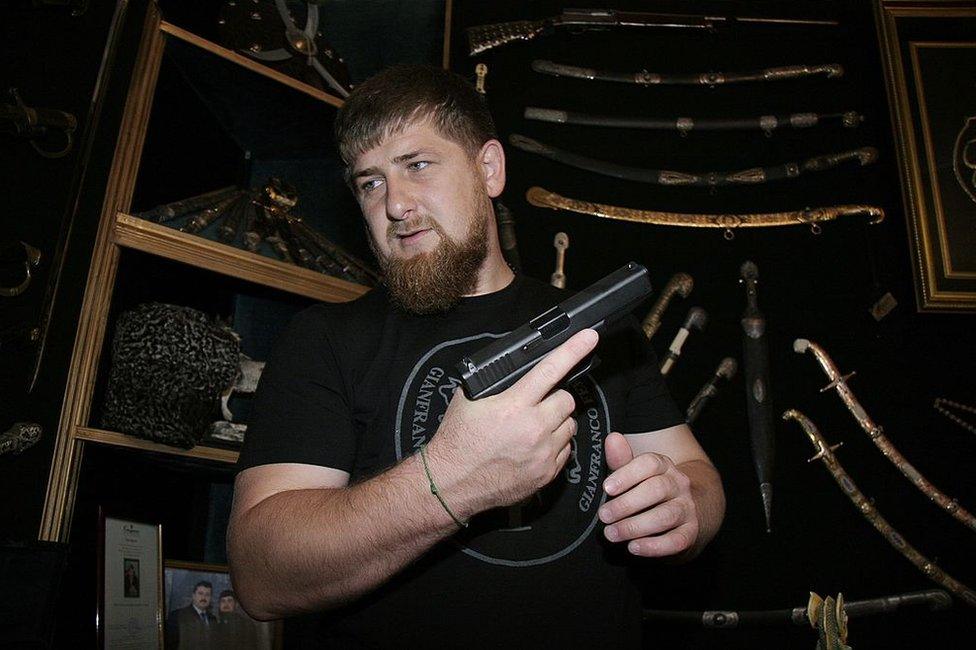
Ramzan Kadyrov displaying his collection of swords and guns
Since then he has become the single most influential and prominent opponent of Kadyrov in a busy émigré blogosphere. With more than 350,000 subscribers to his YouTube channels - despite the fact that the population of Chechnya is only 1.2 million - he relentlessly hits out at Ramzan Kadyrov's apparently limitless power in Chechnya, the regime's human rights abuses and its corruption.
New clouds began to gather for the blogger following a long phone conversation with Ramzan Kadyrov's right-hand man, the chair of the Chechen parliament, Magomed Daudov. In Chechnya this universally feared man, believed to be personally responsible for the well-documented campaign of persecution of the republic's gay community, is known simply by his nickname "Lord".
Lord initiated the conversation with Tumso but found himself lambasted by the blogger, who then posted the whole thing on YouTube, in a series of posts lasting more than two hours. Later, when Tumso publicly called Kadyrov's father Akhmat a traitor for siding with the Russians in their 1999 invasion of the republic, Lord evidently decided it was time to teach him a lesson.
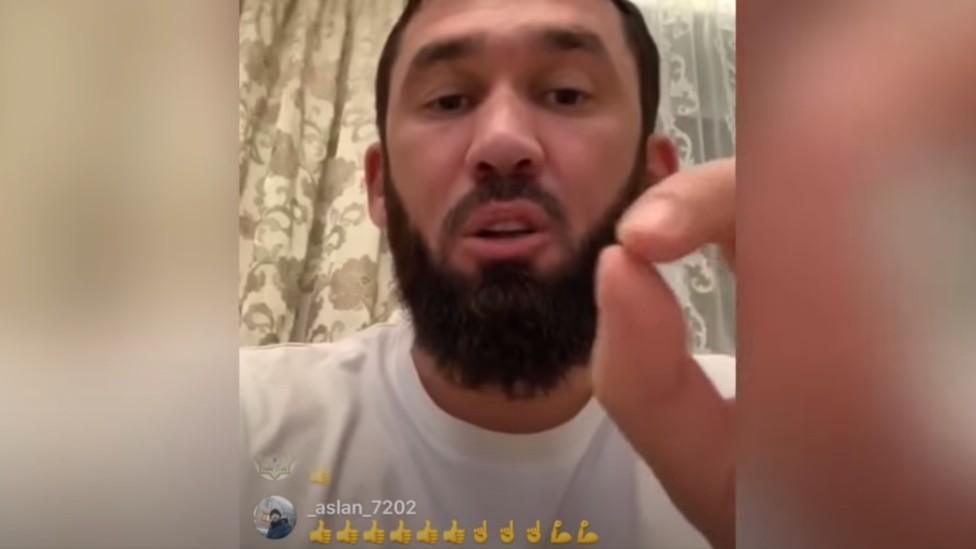
Magomed Daudov declaring a blood feud
In March last year Lord posted online an extraordinary announcement, external for a serving Russian state official. "Tumso," he said, looking at his phone as he filmed himself, "I am officially telling you from me, and from my brothers. You know who my brothers are. You talked about Akhmat [Kadyrov], and this is now a blood feud. For as long as I have blood in my veins, you are my enemy, and the enemy of my brothers. And we're going to find you."
The tradition of the blood feud, the revenge killing of a murderer or their relative, is still alive and well in Chechnya. That Tumso had killed nobody did not seem a problem for Lord.
He went on to say that Tumso would not actually be killed, he'd just be given an "amazingly fun time". But for Chechens, the word for blood feud that Lord used - chir - leaves no room for doubt.
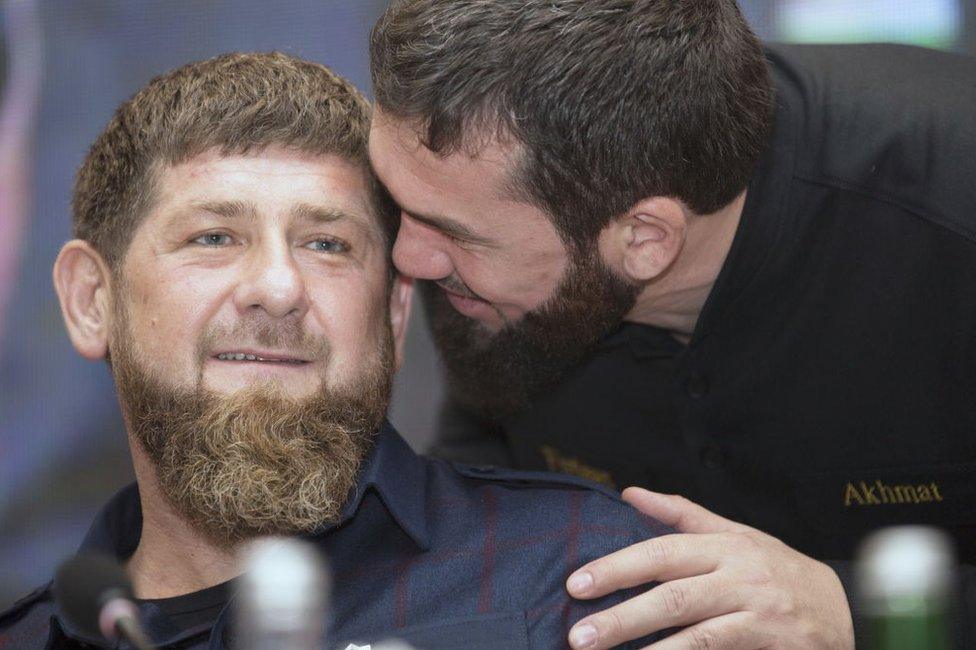
Magomed Daudov whispers in the ear of Ramzan Kadyrov
Things looked even more ominous for Tumso when pro-government social media broadcast the spectacle of his remaining family in Chechnya - an elderly uncle and two other relatives - pronouncing that they were disowning the blogger. More than that, they explicitly gave permission for him to be murdered.
"Let them do whatever they like," said Tumso's uncle and cousins. "He is no long longer part of our family. From this moment on, if anyone kills him, we allow that person to take his blood." A blood feud was being publicly condoned - evidently under duress - by the planned victim's family.
When the attack came, it was on Lord's birthday - a fact eerily reminiscent of the 2007 murder of the journalist Anna Politkovskaya, one of Kadyrov and Vladimir Putin's most prominent critics, who was shot dead on Putin's birthday, 7 October. In a defiant Instagram post after his release from police questioning, Tumso filmed himself smiling and winking mockingly at the camera, with the written message: "Happy birthday, Daudov! Sorry I'm a bit late."
Allow Instagram content?
This article contains content provided by Instagram. We ask for your permission before anything is loaded, as they may be using cookies and other technologies. You may want to read Meta’s Instagram cookie policy, external and privacy policy, external before accepting. To view this content choose ‘accept and continue’.

Then he added a hammer emoji.
Tumso - and many Chechens - were in no doubt who was behind the attack. The Chechen authorities deny involvement.

Chechens in Europe's diasporas say they live under the constant threat of retribution and violence - visited either on themselves or on their relatives back at home. Critics have been beaten and pressured, and Kadyrov's opponents murdered widely over the years, in Qatar, external, Austria, Turkey and Dubai, external, as well as in Moscow and in Chechnya itself. Some were influential militants - sometimes accused of terrorist attacks in Russia - but others were political rivals, or merely critics.
Russian security forces appear to have been involved in more than one of the killings.
Last August Zelimkhan Khangoshvili, a senior commander in the second Chechen war (1999-2005), was approached by a man on a bike and in motorbike leathers in the Kleiner Tiergarten Park in Berlin. Khangoshvili had been on his way to his local mosque for Friday prayers, and had for some reason taken a diversion into the park. His family believe he had been lured there.
The cyclist shot Khangoshvili several times, killing him with a shot to the head. He then jumped on a waiting hire scooter, and escaped to a secluded location by the nearby River Spree, where he changed into a pink T-shirt and shorts, and threw a bag into the water. Two teenage boys witnessed the scene and called the police. The man was arrested minutes later, just before he could disappear into the crowd of tourists in central Berlin. He presented a valid Russian passport under a false name. A bag was recovered from the Spree containing the leather clothes, a wig, and a Glock pistol.
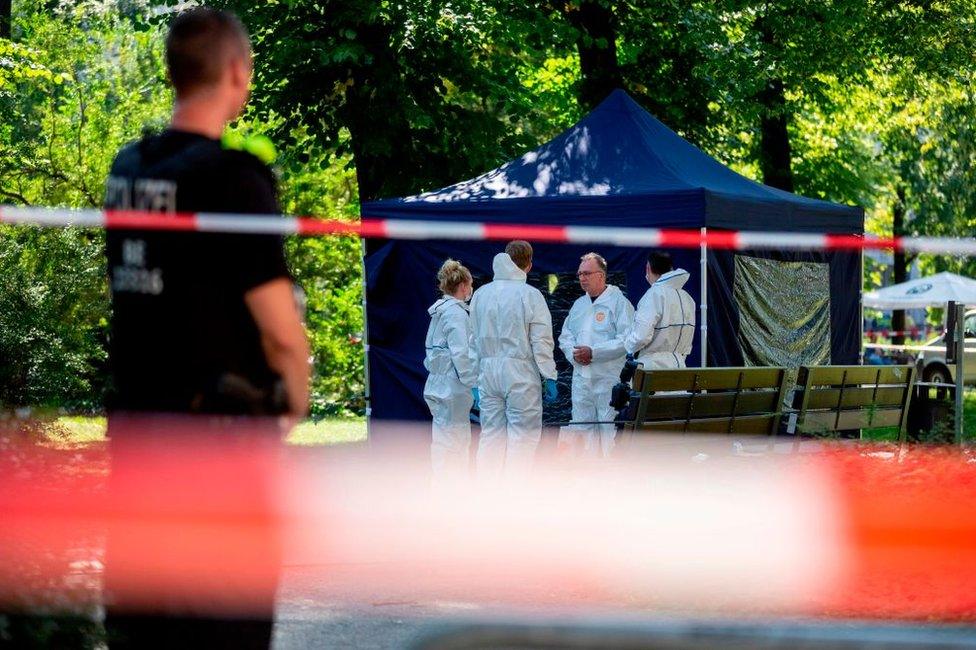
Police forensic experts examine the crime scene after the assassination of Zelimkhan Khangoshvili
The assassination had been intricately and expertly planned and, if it hadn't been for the two boys, the killer would probably have escaped undetected. He had arrived in Berlin hours before the murder, after travelling to Poland where it is thought he picked up the pistol. He knew exactly where and when to find Khangoshvili, he had a means of getaway planted precisely where he needed it, and was evidently acting on a pre-determined exit plan. He must have been operating with accomplices and detailed intelligence - raising suspicions of a sophisticated hit by Russian intelligence.
Listen to Nick Sturdee's documentary for Assignment on the BBC World Service, The Chechen Blogger on the Run
These suspicions grew after the journalist Christo Grozev, at the investigative website Bellingcat, established the true identity and biography of the killer, external - a former Russian special forces soldier called Vadim Krasikov. This man had already committed at least three contract killings in Russia - of businessmen and a regional politician - and had been shielded from prosecution by the intervention of the Russian security services, the FSB.
Having identified Krasikov's phone number - through documents online relating to the purchase of a car by his wife - Grozev then used leaked mobile phone data to trace his movements over the weeks running up to his trip to Berlin. Other than his home, the locations where Krasikov had spent most time were the FSB anti-terrorism office in Moscow - for a few hours at a time - and a high-security and heavily restricted FSB special forces training camp just outside Moscow, where he had spent three days before travelling.
The Russian security services, it appears, had trained and dispatched someone from the criminal world to eliminate a perceived enemy on the streets of Berlin. Grozev wasn't surprised.
"The FSB have their own contingent of former officers," he says. "Or just criminals they can trust or they can hold forever indebted because of, for example, compromising material on them. The FSB is a very corrupt, sprawling organisation."
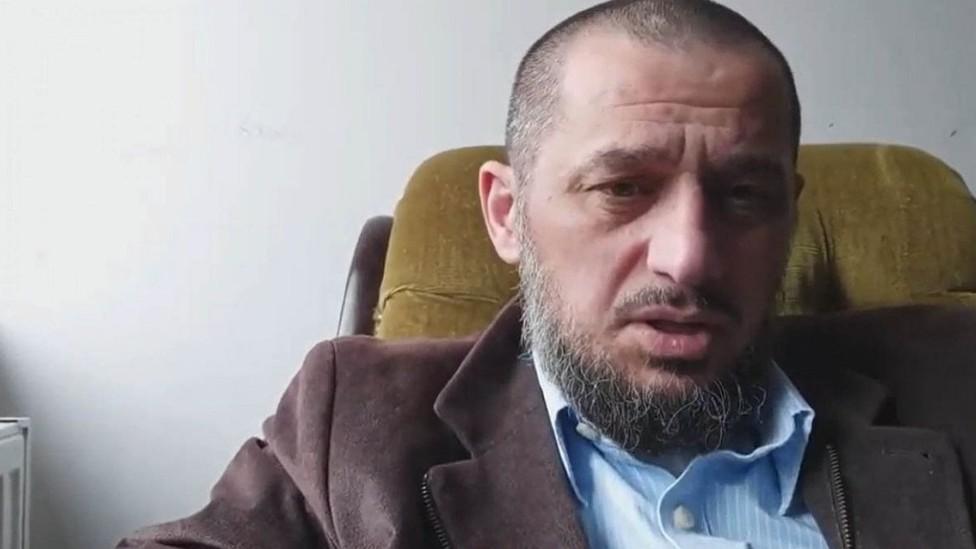
Imran Aliev - stabbed to death in Lille
In January, a second Chechen was murdered by a travelling assassin, this time, in France. Unlike Khangoshvili, the victim was not a former military commander - he wasn't a potential security threat - but a blogger on medication for PTSD, who had insulted Ramzan Kadyrov online.
Although Tumso Abdurakhmanov was in Sweden at the time, he was tipped off about the appearance of a suspicious Chechen, Usman Mamadiev, among the diaspora in Berlin. Immediately he feared for the safety of his wife, children, mother and brother, who were living in the German capital. He provided Mamadiev's details to German police, he says. But instead the visitor travelled on to Belgium.
There he visited the blogger, Imran Aliev, whom he had befriended online, pretending to be a cancer patient travelling to Europe for treatment. On 29 January the two of them travelled to Lille, in northern France, checking in to the Coq Hardi Hotel. The next morning Aliev's body was found in their room, with a reported 135 stab wounds. By then Mamadiev had left for Berlin and was soon on a flight back to Moscow.
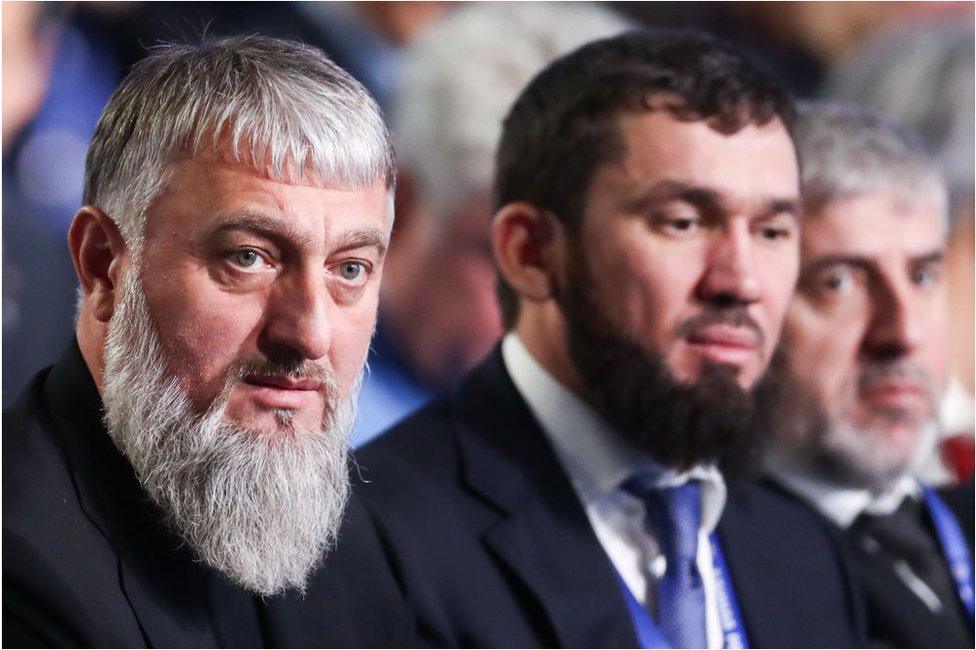
Adam Delimkhanov (left) and Magomed Daudov
Following Aliev's murder, Tumso carried out an investigation and posted the results online. He said he had established Mamadiev's connection to a close Kadyrov ally, a member of the Russian parliament for the ruling United Russia party, Adam Delimkhanov. He also reported that Mamadiev had suspiciously bought a car soon after his return home.
The Chechen authorities have denied involvement in Imran Aliev's killing. It has not been possible to reach Mamadiev for comment.

Less than a month later, Tumso himself was the target. His head and body are marked by scars and wounds from the hammer blows, and he is clearly extremely lucky to be alive. "It was a miracle," he says. "I realised that as I sat at the police station and thought through what had somehow passed me by. The first emotions you get are impossible to convey. You feel at that moment as though you've been born again, when you think of how you were on the very edge when someone was hitting you with a hammer."
It was fortunate, perhaps, that his family remained in Germany.
Unlike Khangoshvili's killer, Tumso's attacker, Ruslan Mamaev, had not travelled on fake ID. It's even easy to find his Facebook page, where the last comment is from his father, Marat, wishing him a happy birthday last August. Photos reveal a tall man with Asiatic features and dark, modishly cut hair, sitting in what looks like a fashionable café, with Central Asian carpets behind him.
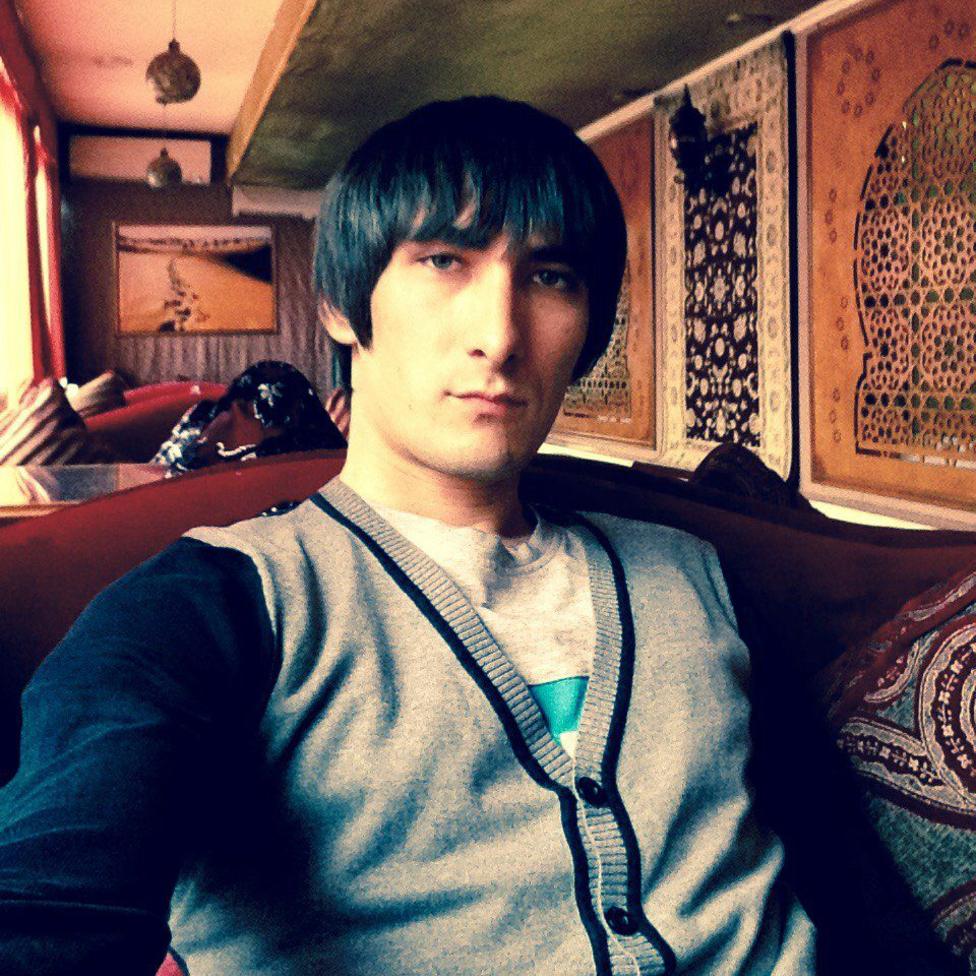
Ruslan Mamaev - nothing in his biography seems to suggest a killer
Mamaev is originally from Kazakhstan, but moved to Omsk in Siberia as a boy. There he started college but dropped out, before travelling to Moscow and apparently working in construction. Judging from a 2018 court ruling, Mamaev seems to have had money problems. He was ordered to pay back half a million roubles - about £5,500 - that he had borrowed from a bank.
I've reached out to some of Mamaev's friends and his family. His girlfriend told me on social media that he wouldn't harm another person, that the whole family is in shock and that she doesn't understand how or why he went to Sweden. Apart from that, no-one seems to want to talk.
Nothing in Mamaev's biography seems to suggest a killer - nor any prior connection with Chechnya. But flight data records in Russia, leaked to Bellingcat, do demonstrate that he travelled to Grozny on two occasions shortly before he travelled to Sweden. He returned to Moscow from his second trip on 15 February. Five days later, he booked his flight to Copenhagen for 24 February. Two days after that he was in Tumso's flat in Sweden, with a hammer.
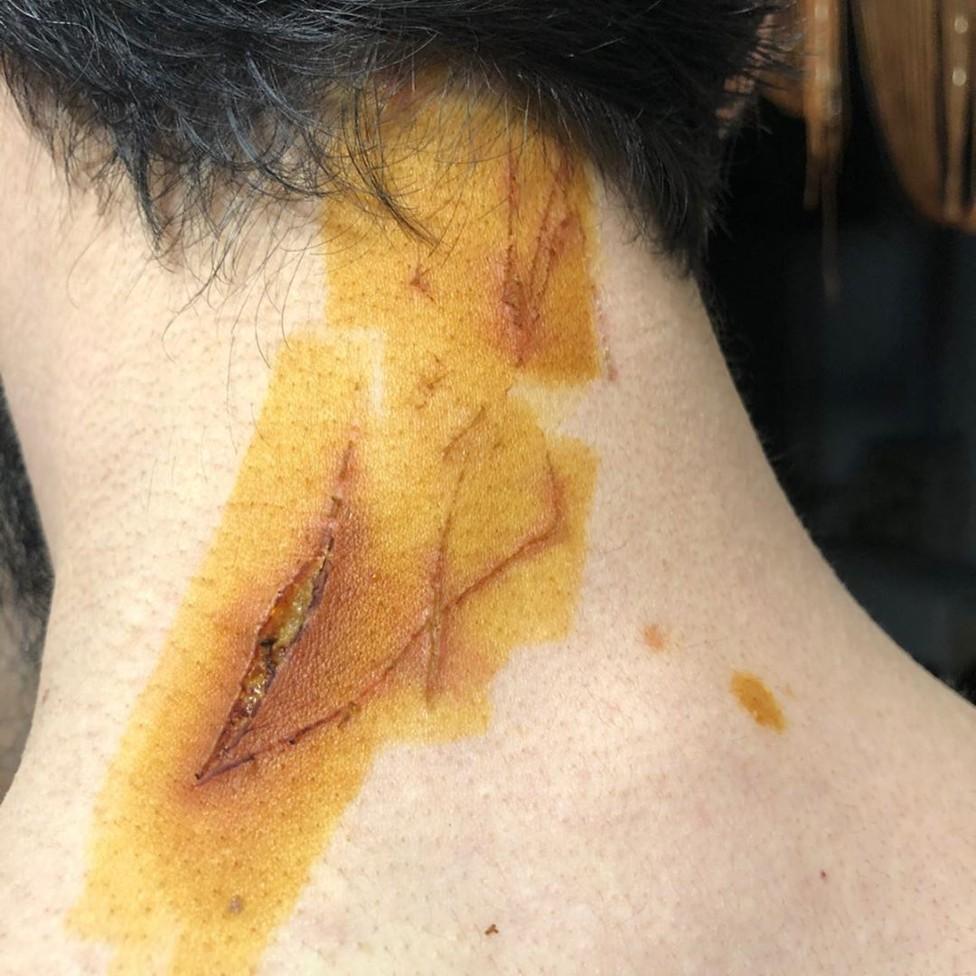
A gash in Tumso Abdurakhmanov's neck, caused by the claws of the hammer
It has also emerged that immediately after his December trip to Grozny, Mamaev flew to Copenhagen - on what looks like a short recce. According to Bellingcat, it was the first time he had ever travelled outside the former Soviet Union, and he speaks no foreign languages. Like Krasikov in Berlin, he would certainly have been receiving help from accomplices.
A second individual, a Chechen woman, has been detained by Swedish police as a suspect. She travelled to Sweden from France shortly before the attack. And last weekend the Swedish authorities announced they were arresting - in absentia - a third Russian citizen. He's been named as Imran Khaskhanov, a Chechen from Mamaev's hometown of Omsk, and he's also believed to have travelled to Sweden at the time of the attack.
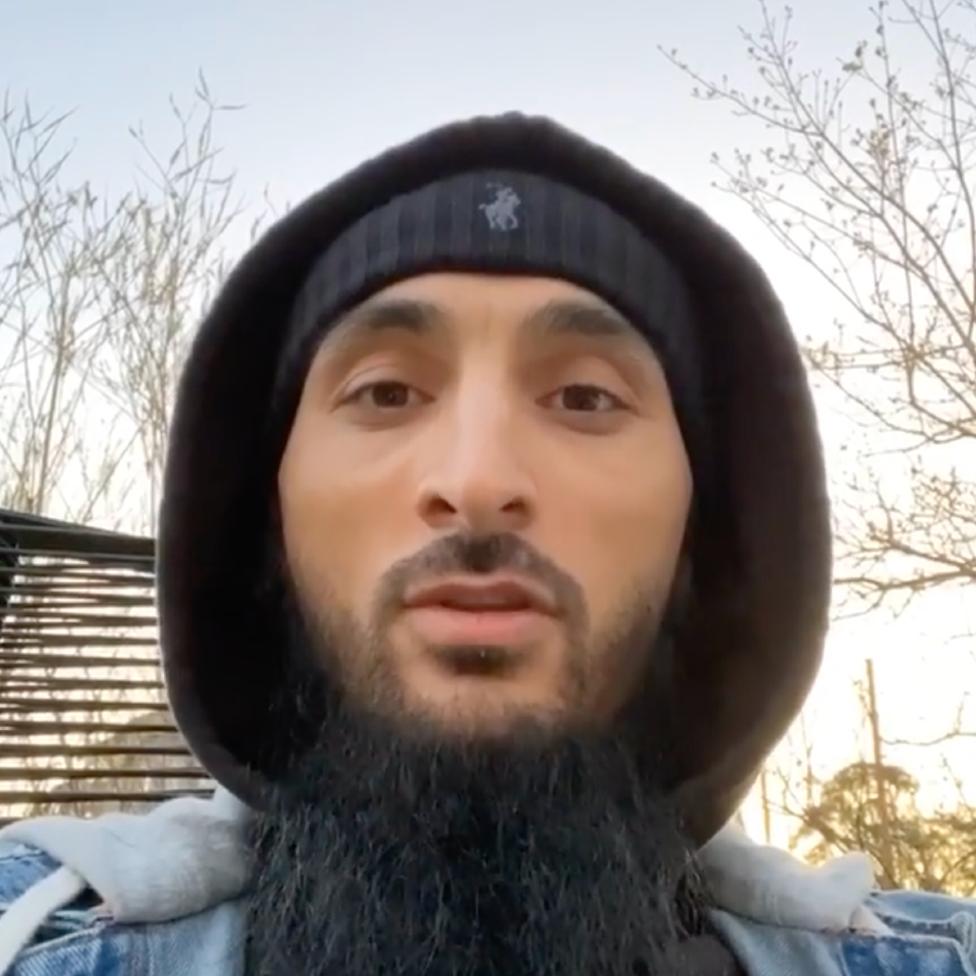
Tumso blogging on Instagram in April, two months after the attack
Mamaev's motive for apparently trying to kill a man he had never met is unclear, but Tumso has a theory. Much as Vadim Krasikov may have been drawn into the FSB's orbit as a result of his prosecution for murder, Tumso believes that Mamaev's debts may have laid him open to recruitment and exploitation by those who wanted to organise an assassination attempt that could easily be denied.
Tumso is confident that the organisation of the attack was beyond the abilities of Kadyrov's circle. Mamaev had managed to establish Tumso's address in hiding, to get through a door requiring a pincode, and to find and enter his apartment unnoticed as he slept. The blogger believes this points to FSB involvement.
But Tumso is not a defector from Russian military intelligence, like Sergei Skripal, or a former officer of the FSB working as a consultant for British intelligence, like Alexander Litvinenko. Why would the FSB organise an assassination attempt on a Chechen blogger living in Sweden? Tumso, again, has an explanation - money.
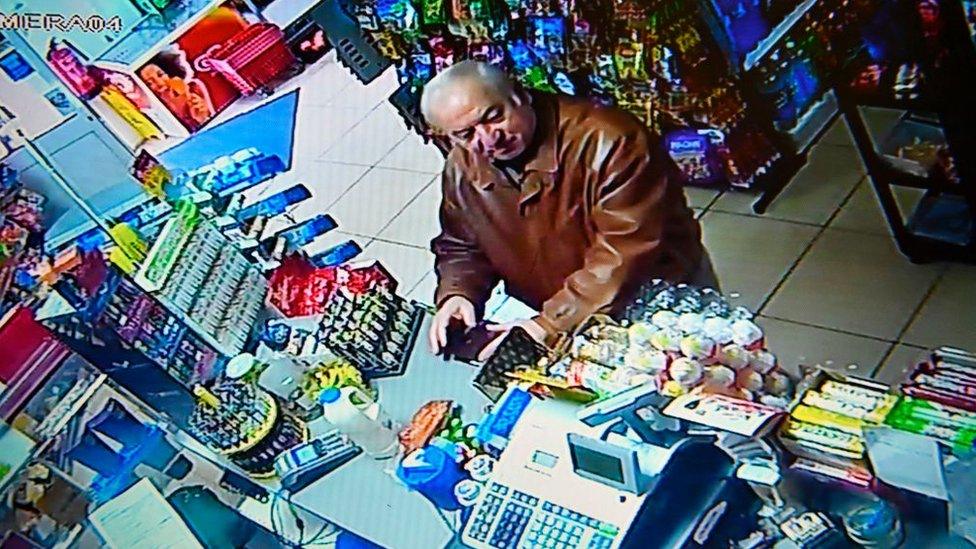
Sergei Skripal and his daughter Yulia were targeted with the nerve agent, Novichok
"I have information - which I can't prove or confirm - that the FSB may have sold that information to Kadyrov. And if that's true, there's nothing remotely strange about that," he says. "This is Russia - and it's totally normal for different state structures merely to sell things to each other. In Chechnya we've seen that for a long time."
The relationship between Russia and Chechnya, one of the Russian Federation's 22 republics, is itself partly a financial one. Moscow props up Chechnya by pouring in millions of dollars. In return Kadyrov's brutal rule ensures there is no dissent.
"It's a marriage of convenience," says Katya Sokirianskaia of the Moscow based Conflict Analysis and Prevention Centre. "Very clearly Putin thinks that Ramzan is solving his problems in Chechnya. On the other hand, on the Ramzan side, it is very clear that Vladimir Putin guarantees his biological survival - the survival of Ramzan himself and his family, his children and his close friends, his circle."
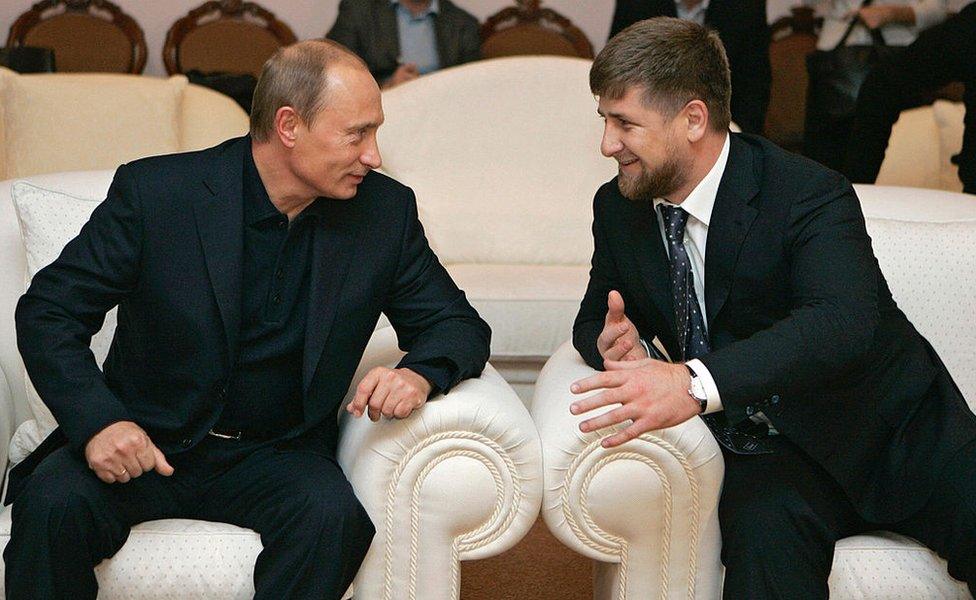
Vladimir Putin and Ramzan Kadyrov in 2007
Because Kadyrov and his circle, as they well know, can not only declare blood feuds - they can be the subject of them.
"Ramzan Kadyrov has blood enemies, and many of his associates as well. They have blood. People who blame them for death and humiliation. And they're waiting for the moment to take their revenge, to execute this blood feud. And Chechens can wait for a very long time."
It's not known who ordered Ruslan Mamaev to travel to Sweden and attack Tumso with a hammer as he slept. It's not known whether the FSB was involved, and it cannot be proved it was the execution of a blood feud
But the second most powerful public official in Chechnya expressly warned of such an action, and pro-government social media effectively condoned it by carrying the statement made by Tumso's relatives, in which they gave their consent for him to be murdered.
And for this, it would appear, neither Kadyrov nor the Chechen government have received any criticism from the Russian government - or President Vladimir Putin.
You may also be interested in:
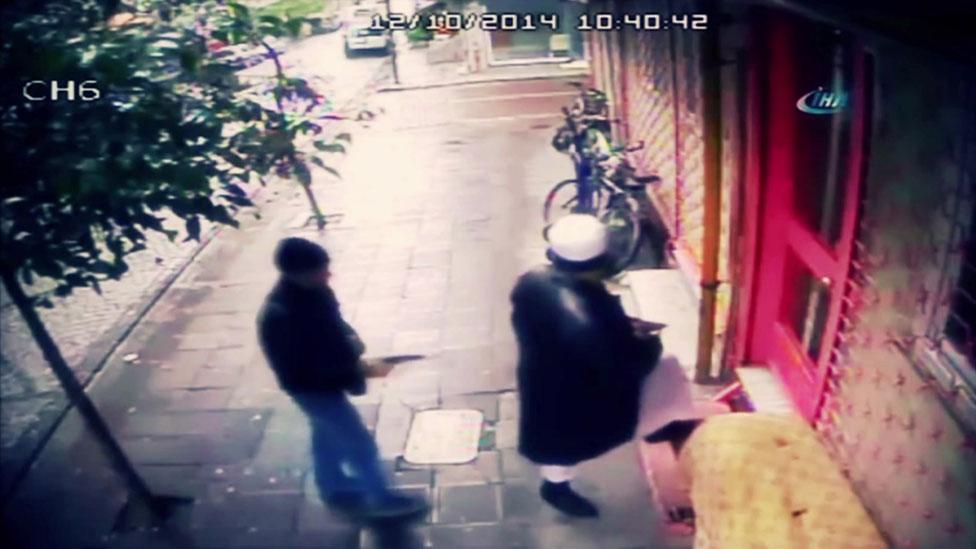
A series of assassinations has taken place in Turkey of men from the countries of the former USSR. There's evidence that some were carried out by killers from Russia - including, in one case, names, photographs and a memory stick carelessly left behind for Turkish police to study.
Have Russian hitmen been killing with impunity in Turkey? (2016)